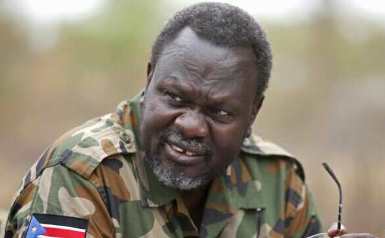Greater Equatoria region split over rebel support
March 25, 2014 (JUBA) – Leaders and intellectuals from South Sudan’s Greater Equatoria are sharply divided over whether the region should support a rebellion against president Salva Kiir’s government or remain neutral.

“The views expressed in the release do not represent the people of Equatoria. Yes, those outside the region in the diaspora are our brothers and sisters but what they say does not necessarily represent our people inside the country,” Bakosoro said in a statement broadcast on state-owned South Sudan Television (SSTV).
In the 22 March press statement, GRECOR said Machar’s vision is “consistent with the comprehensive and detailed aspirations of the peoples of [the] Equatoria region” and the wider population of South Sudan in general.
However, Bakosoro said that while the people of Equatoria championed democracy and issues of national importance, they were not known for agitating or back-room politicking.
“We do not gossip and do not agitate. We are straight when it comes to issues of democracy and governance,” he said.
GRECOR was created prior to the secession of South Sudan from Sudan in 2011 as an advocacy body for the people of the Greater Equatoria region, with Khartoum-based Wani Tombe installed as its chairperson.
In its statement, the umbrella organisation, which represents various political parties, communities and NGOs of the Equatoria region, also expressed its willingness to join with the armed opposition group in ongoing peace talks in the Ethiopian capital, Addis Ababa, saying negotiations to date had largely focused on Upper Nile and Bahr el Ghazal regions, excluding Greater Equatoria.
GRECOR’s statement drew mixed reactions from youth and intellectuals from the area spoken to by Sudan Tribune on Tuesday.
While some supported the call to join the rebellion, others said the comments were an attempt by GRECOR members to seek the government’s attention for their own advantage.
“This conflict is becoming an opportunity for employment by the opportunists and betrayers. If you have been following closely the political activities of some of [South Sudan’s] leaders during [the] interim period, you have seen that there were people who did not want the South to secede from Sudan. One Wani Tombe was one of these groups … He decided to remain in Sudan, where he decided yesterday to make this poisonous release because he is hoping to take advantage of the peace that may be signed so that he could get a position,” Nelson Moses Duku, of Central Equatoria’s Yei River county, said on Tuesday.
However, Johson Juma, a native of Eastern Equatoria’s Magwi County refuted Duku’s claims, pointing out that issues raised in GRECOR’s statement were consistent with the views of the people in the region
“I think some of our leaders have been confused by their positions to the extent that they are unable to know the people of Equatoria have for long time been marginalised and subordinated. Instead of rejecting the call, the leaders should first of all study the genuineness of the issues raised in the release,” Juma told Sudan Tribune.
“I have read it thoroughly and what I found out is that it calls on our people in all the three Equatoria states to work together and mobilise the support for the cause of the opposition movement because issues identified by this group are consistent to the aspirations of the people of Equatoria,” he adds.
Headquartered in Juba, GRECOR’s objectives include advocating for unity within the region, as well as promoting a federal system of governance and representing the region on issues relating to power and wealth-sharing, democracy and humanity.
(ST)
